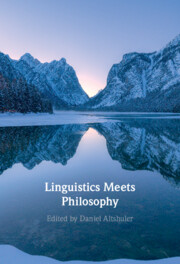‘This collection offers a comprehensive and authoritative survey of where semantics and pragmatics stand after a half century of transformative collaboration between philosophers and linguists. Leading researchers make a powerful case for continued partnership, highlighting questions where progress requires integrating the two perspectives. The volume is an indispensable resource for linguists and philosophers who aspire to deepen our understanding of meaning and communication.’
Zoltán Gendler Szabó - John S. Saden Professor of Philosophy, Yale University
‘An excellent addition to the thriving new genre of handbooks and survey articles - distinguishing itself by its emphasis on combining insights from philosophy and linguistics on issues of interest to all scholars of natural language meaning. Ambitious in conception, Altshuler has shepherded the enterprise to an impressive final product. Contributors include researchers from both fields, topics include some classic and some emerging areas of investigation. The combination makes for a compelling volume.’
Veneeta Dayal - Professor of Linguistics, Yale University
‘Solicited with editorial insight and expertise, the chapters revisit foundational commitments, set classical questions in a new light, and raise new big questions, sometimes sparked by cross-linguistic work. Written in a careful and accessible way, this book is bound to inspire a new dialog between linguists and philosophers.’
Anna Szabolcsi - New York University
‘Since the interdisciplinary project of formal semantics gave rise to a discipline within linguistics, the interactions between philosophers and linguists have significantly decreased. Yet, as this wonderful collection shows, new kinds of conversation have emerged, around specific topics of interest to both philosophy and linguistics.’
François Recanati - Collège de France
‘A splendid collection, shining a light on some of the most pressing issues in contemporary semantic theory. Taken as a whole, these studies make a compelling case for the importance of interaction between linguists and philosophers to the historical development of semantics as a field - and for why we should keep talking to each other in the future.’
Hazel Pearson - Senior Lecturer in Linguistics



